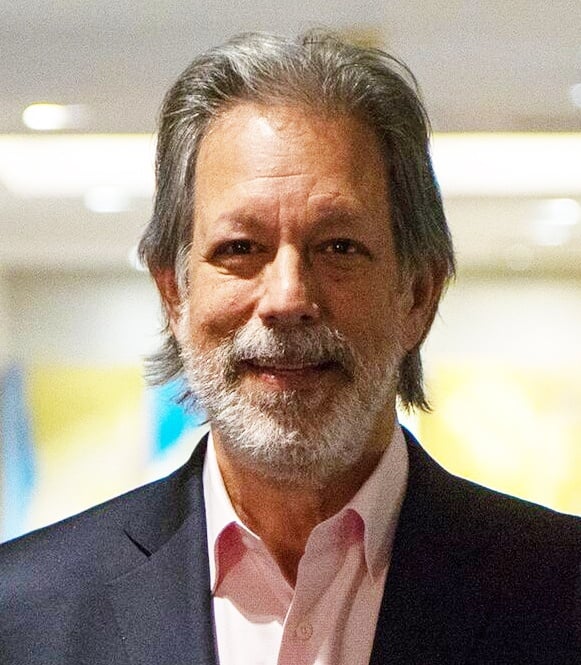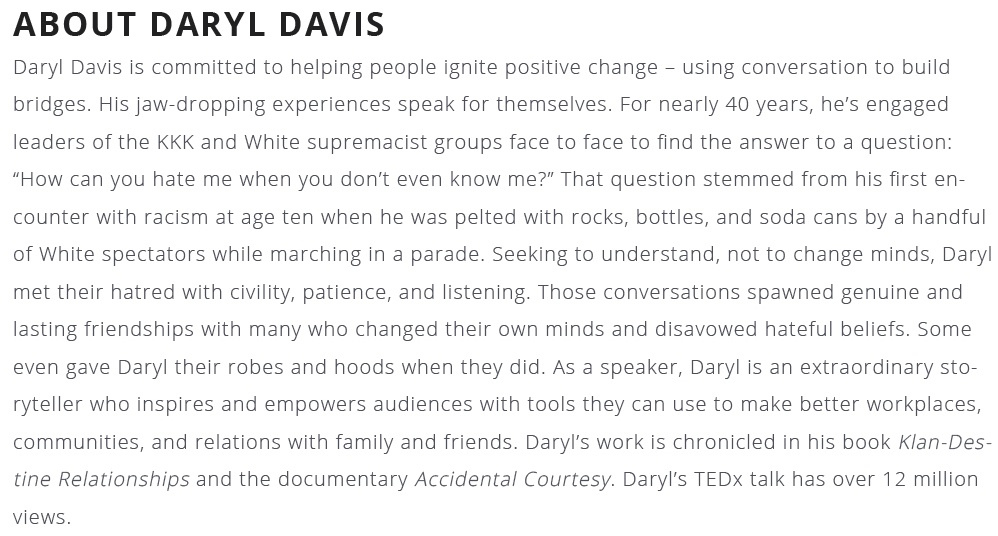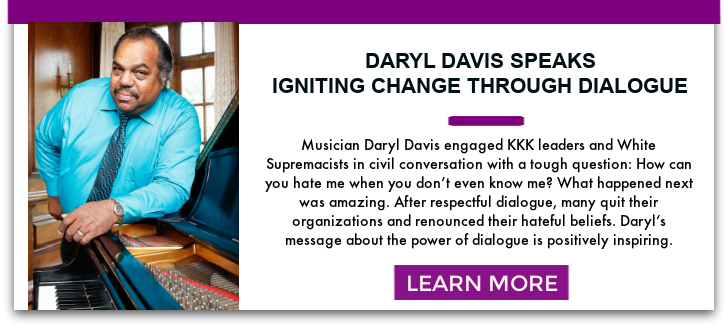Daryl Davis Meets Extreme Bias with Civility - Conversations That Ignite Change
Managing/Leading Change | Diversity & Inclusion | Daryl Davis
TURNING DOWN THE TEMPERATURE
Is it possible to ignite positive change in a polarized world? Can we make our community, workplace, and holiday dinner table more civil? I was beginning to lose hope – and then I met DARYL DAVIS. I’ve never met anyone like him – and I’d bet you haven’t either.
People will never see eye to eye on everything – that’s a given. But what happens when the area of disagreement is about something as basic as your right to exist? How is it possible to have a civil conversation, let alone common ground, with someone who believes to their core that you’re absolutely inferior? That’s the issue Daryl confronted head-on in a jaw-dropping way. His story and the lessons it reveals is positively inspiring!
HOW CAN YOU HATE ME WHEN YOU DON’T EVEN KNOW ME?
Daryl is a musician by education and profession. He’s played all over the world and was for 32-years, on and off, he was Chuck Berry’s pianist.
But while music is his profession, Daryl has an obsession rooted in a childhood experience with racism. At ten, he was the only Black Cub Scout marching in a parade near Boston when he was pelted by rocks, bottles, and soda cans by white parade-watchers. Tending to his injuries, his parents explained why it happened: because of the color of his skin.
This made no sense to Daryl. By then he had lived around the world with his family who were in the U.S. foreign service – moving to different countries every two years. The schools he attended with kids of other diplomatic families looked like the United Nations in terms of diversity. Never did he encounter this kind of situation before.
That parade experience led Daryl to ask a powerful question that still drives him today: How can you hate me when you don’t even know me?
DARYL DAVIS PROVES THE POWER OF DIALOGUE
Daryl’s search for an answer took a turn about 40 years ago after he’d finished playing a club with his band. A White man approached him to say he’d never heard a Black man play piano like Jerry Lee Lewis. Daryl explained that he, Jerry Lee, and a whole generation of musicians, were influenced by the Black boogie-woogie and blues musicians who came before them. The white guy wasn’t having any of it and said it couldn’t be true, even after explaining that Jerry Lee was a personal friend and told him directly that was so. Then, the White guy explained he was a member of the Ku Klux Klan. This was the opening Daryl had been waiting for.
From that encounter, Daryl was introduced to and became unlikely friends of, members and leaders of the KKK all over America. His intent was not to try and change their minds – but to understand why they believed as they did. He wanted to ask them, face-to-face, how can you hate me when you don’t even know me? He didn’t argue with those he met – he’d listen politely, respecting their right to speak as they explained how he was inferior to them and why the races needed to be kept separate. While Daryl respected their right to speak, he did not respect their views and politely and respectfully explained why.
Over months, through communication and patience, Daryl became true friends with members of the KKK and other White Supremacist organizations. Astonishingly, after getting to know a Black man, many KKK members quit their old lives. In fact, many gave Daryl their robes and hoods. The stories Daryl tells of personal breakthroughs by people thought to be unreachable are amazing! Here’s one jaw-dropping example you will not believe:
CONVERSATION & ENGAGEMENT LOWER THE TEMPERATURE
“People aren’t born biased. They learn it through communication. If they can learn it that way, they can unlearn it through communication,” says Daryl.
The big lessons from his experiences, Daryl explains, is that we all want the same five things: We want to be loved; we want to be respected; we want to be heard, we want to be treated fairly; and we want to same things for our family as everyone else wants to their family.
People fear what they don’t know. The extremists Daryl befriended never knew a Black man and once they did they realized there was nothing to fear. Exposure and education disarmed their fear. Unchecked, that fear can turn into hate which can then turn into violence. Daryl has made it his mission to share his stories and show people how to have conversations that ignite change – in their companies, in their communities, and around their family dinner tables.
Daryl is author of Klan-destine Relationships: A Black Man's Odyssey in the Ku Klux Klan and he has a new book in the works. Daryl's TEDx talk has over 10 million views and the film about his work, Accidental Courtesy, gained considerable acclaim. Here's the trailer to that film:
CREATING A BETTER WORKPLACE, COMMUNITY AND HOLIDAY DINNER TABLE
We live in polarizing times, but we all have a choice on how we use communication to reduce the friction. “We spend too much time talking past each other, around each other, and at each other. It’s time to start talking with each other,” says Daryl. Underpinning everything is the idea that you cannot talk people out of their beliefs. You cannot change people’s minds – they have to come around to changing their own minds.
As Daryl proves, the change that can come about through conversation and engagement can be positively amazing. “I am a firm believer that a missed opportunity for dialogue is a missed opportunity for conflict resolution, as I've proven for over nearly 40 years of my work.”
Photo by Rachel Chason/Washington Post
About Tony D'Amelio
Tony has spent his career putting talented people and audiences together, first in the music business and later representing the world's leading speakers. After concluding 27 years as Executive Vice President of the Washington Speakers Bureau, Tony launched D'Amelio Network, a boutique firm that manages the speaking activities of a select group of experts on business, management, politics and current events. Clients include: Mike Abrashoff, Mariana Atencio, Chris Barton, Lisa Bodell, Geoff Colvin, Daryl Davis, Suneel Gupta, Ron Insana, Katty Kay, Polly LaBarre, Nicole Malachowski, Ken Schmidt, and Bob Woodward.

.png)

.jpg)


